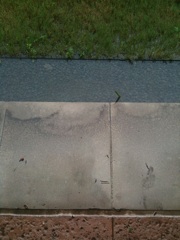Tomorrow, I will put Nothing of Consequence (my new collection of tunes) up on the site and provide appropriate links. I might put it up on the iTunes store or on emusic, but for now it will be free to anyone who drops by and clicks the link. I’m excited to see if I can get 100 people to download the album. That would be really cool. To my mind, it’s like having a recital with 100 people in the audience and that’s the way I’m approaching music right now.
The era of the rock star is fading (more slowly than it ought) and taking with it a pile of assumptions. Platinum albums that lead to mansions and fast cars are not what the future has to offer a dreaming musician. What artists have to look forward to now has perhaps more in common with 200 years ago than 50 which, incidentally, I think is what we’re all looking at in every aspect of our lives. But the value of music and art is pushing ahead into a place where everything revolves around real connections.

I would never pretend to guess what the almighty market will do with music. People will still get paid to play and to write. There will be commercials for years to come that will need hip and edgy sounds from the almost underground to advertise bad cologne and cars. There will always be posers who need to listen to the most obscure pieces they can find. There will always be artistic adventurers who genuinely crave and seek out the new. And in the absence of those, there will always be family and friends (hi mom!) which is sort of the point of creative endeavors the more I think about it. Community. Family.
My son is entering a creative phase. He’s two. The other day, he wrote his name. There’s really no way to describe how that feels. To see your child do something so amazing is visceral and powerful. I want to hear the songs he sings. See the towers he builds. Trace the lines of his crayons when he says it’s time to “color-color paper!” I have the same sense when it comes to my brother and my friends. I want to see what they’re doing. I want to read the pages of their manuscripts and look at their photographs and paintings. In them there are reflections of times and places that have meaning for me and I get to see them through another lens. The work offers me something and I take it.
None of that, mind you, recognizes money or professional status. T.S. Eliot was a banker when he wrote The Waste Land. Many great composers and artists created their ouvre without so much as a dime coming back for their efforts. The reason I ignore these things is that they have very little to do with the quality of the work or what draws me to it. Things like this certainly don’t compel me to create.
This is a long way of saying that no one needs publishers or middlemen anymore and no one really needs to be creating full time for it to have meaning. The Internet makes sharing a story or song as easy as dropping some extra tomatoes on someone’s porch when they’re not home. It’s easy for art to be by and for a community and if that sounds like a lot of hippie-free-love crap, it almost is. I say almost because the sentiment is over the top most of the time. But when I read a cool piece of fiction written by a friend or download some tunes by someone I know who lives too far away for me to jam with, it’s awesomely true. I see more and more of my moonlighting artist friends getting that point. It’s exciting. The excuses for skipping out on one’s creative life are fewer by the day.
So in the spirit of saluting anyone who buys notebooks for scribbling in over an outrageously priced coffee or sets up a blog to push a story like a crazy street preacher or sits in the park tentatively adding to the sounds of the city with a quiet guitar I will put my music out there too. As my uncle always said, more fools, more fun.



